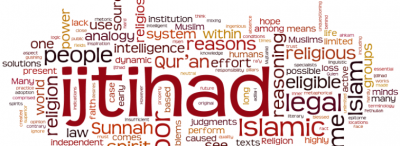Among the tools listed by the classical ulama who specialized in the fundamentals of law and jurisprudence (usul al-fiqh), we find three basic notions that provide a way of making a connection between universal principles and social realities that change with the passage of time and cultures. A study shows that they present a significant amount of leeway for proposing new readings of the sources, finding new responses or thinking of innovative models of social and even economic organization. It is Muslim thinking that is stalled these days: the tools are available, and the work to be done is the double task of reading the sources and interpreting the world. It must also be remembered that it is not a question of understanding the world better in order to adapt to it, but, at a much deeper level, through this contact with the changing realities of the world (scientific, social, political, and economic), it is a question of rereading the scriptural sources themselves with a new eye. In doing this, it is essential to remember that the corpus of the Sharia is a human construction, and some aspects of it may evolve just as human thought evolves and just as some aspects of the Qur’an and the Sunna were revealed over time. This is precisely the meaning of the Prophetic tradition that “God sent to this community, every hundred years, someone to renew its religion.” This renewal is not a modification of the sources but a transformation of the mind and eyes that read them, which are indeed naturally influenced by the new social, political, and scientific environment in which they live. A new context changes the horizon of the text, renews it, and sometimes gives it an original purport, providing responses never before imagined.
The three notions in the heading act exactly in this way. Beginning from the state of society, they invite the mind to reread the sources and give it the means either to find a response that has already been given (for example, in another similar case), or to think of a new legal development (when the texts say nothing that applies to the case in question), or to state a specific legal opinion allowing some adaptation (more or less restricted to circumstance and time). This is an essential process for Muslims living in the West, even if, as we shall see in the next section, these tools must be used with a certain number of necessary conditions if one is to avoid falling into the trap of “racing into adaptation,” which is either timid or risky, and never wholly reliable.





While Muslims in the West, or wherever they are a minority, face certain daunting challenges in living in accordance with the principles of Islam, the need for regular renewal is equally urgent, albeit in different ways, in countries where Muslims are a majority and thus enjoy many facilities and institutions to aid them. In such situations there is a tendency to become complacent, to feel that one is already doing well, and thus gradually sink into mechanical practice and repetition of what is already established, with the mind and heart less and less involved, and an increasing lack of self-criticism and humility.
The situation is compounded when the religious institutions feel that, with them on hand to make all the decisions, the “ordinary Muslims” not only do not need to think for themselves, but are told that they are not qualified to do so. This is justifiable when it comes to complex legal or technical issues, but is definitely not so when it results in Muslims being told that they should not read the Qur’an on their own.